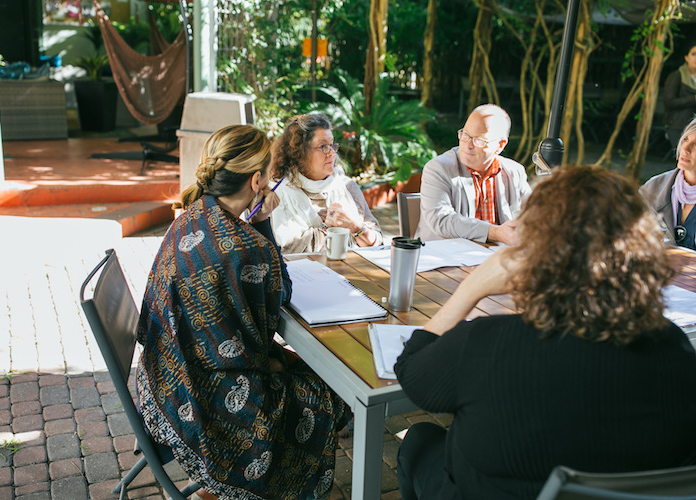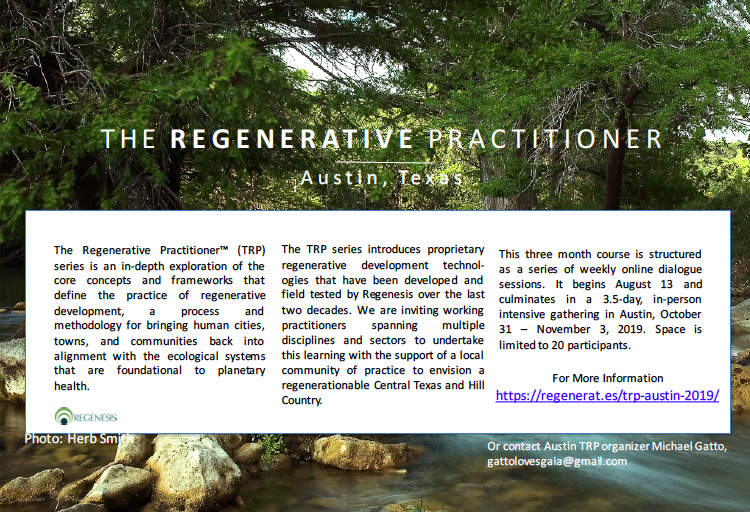Sponsored Post – The Regenesis Institute for Regenerative Practice
Written by Austin Regen Guild and The Regenesis Institute for Regenerative Practice
What is the role of communities and cities in a future marked by across-the-board instability—ecological, social, economic and political?
Take climate change, for example. The best practices for cities wishing to take leadership on this issue are two-fold – to aggressively work to reduce emissions, and to develop resilience against rising seas, rising temperatures, and increasingly volatile weather patterns.
These are incredibly important actions to take, and those cities who are taking them should be commended. But do we stop there? If we do, then even our most proactive leaders are being fundamentally reactive—defining the agenda for their actions based on what’s currently in existence, rather than looking for some new, inspiriting potential that we can work together to manifest.
The decade of ecosystem restoration
Earlier this year, the UN General Assembly declared that 2021-2030 would be the decade of ecosystem restoration. In so doing, they have put into principle the profound realization that the development of ecological systems are a solution multiplier with the potential to create jobs and increase food security while turning back the clock on climate change. Additionally, and less widely recognized, this mandate to restore the ecological health of the planet creates a meaningful opportunity for those who are invested in the destiny of the cities and communities they call home.
On an ecologically healthy planet, each unique ecosystem plays a unique role in contributing to the health of the systems it touches. Rivers filter clean water into surrounding forests, estuaries provide a sheltered place for nutrient exchange between land and sea, beaches, prairies and mountaintops provide nesting and breeding grounds for particular species of turtles, birds and butterflies. What if, through our inhabitation of and interaction with these ecological systems, our cities and communities could also make life-giving giving contributions to the systems that we touch?
This question is fundamental to the emerging field of regenerative development. Regenerative development goes beyond sustainability to focus on the capabilities that human individuals, enterprises, and communities must develop in order to become effective co-evolutionary partners with nature in their specific places. Currently, we’re working to support the emergence of communities of regenerative practice in Austin (and five other cities, a growing list) to take up this call.
The Regenerative Practitioner Series
The Austin Regen Guild is partnering with the Regenesis Institute for Regenerative Practice to bring a focused learning opportunity to Austin-area practitioners who are interested in integrating regenerative development into their practice.
View the recording of our webinar Intro to Regenerative Practice below:
Intro to Regenerative Practice from Regenesis Group on Vimeo.
The Regenerative Practitioner provides a deep dive into the fundamental shifts in how we work and how we think that underlie a regenerative approach to development of all kinds. Participants work together to deeply engage with the course curriculum, Regenesis instructors, and one another. Since 2013, over 400 practitioners from all over the world have gone through the program.
This groundbreaking program is for those working as practitioners in various fields including design, development and planning; community activism and development; civic leadership and policy; social entrepreneurship and business development; permaculture and sustainable agriculture; education; the arts and healing arts; and more.
This course may be a good fit for you if you resonate with one or more of these statements:
- You often see bigger potential than is being realized on the projects you’re involved in but haven’t found a way to help your collaborators and/or clients see and align with that potential.
- You know that sustainability will never accomplish its aims if we can’t change the way we think and work, but you’re not sure how to achieve this.
- Your work is important and meaningful to you, but you still feel the drive to learn and develop along a path so that your work and the essence of “who you are” become further and further integrated.
- You have a track record of accomplishment, and yet you continually see possibilities beyond the level that you are currently able to realize.
The Austin Regen Guild seeks to use this course to expand our local community of regenerative practice to reach a critical mass of practitioners so aligned in our efforts and approach that we may actually ‘move the needle’ on critical issues facing our region. We invite you to engage with our community of practice by enrolling in the Regenerative Practitioner Series and joining our ranks. We welcome you to be a part of this growing community.
About The Series
The Regenerative Practitioner™ (TRP) series is an in-depth exploration of the core concepts and frameworks that define the practice of regenerative development, a process and methodology for bringing human cities, towns, and communities back into alignment with the ecological systems that are foundational to planetary health.
The TRP series introduces proprietary regenerative development technologies that have been developed and field tested by Regenesis over the last two decades. We are inviting working practitioners spanning multiple disciplines and sectors to undertake this learning with the support of a local community of practice to envision a regeneration-able Central Texas and Hill Country.
This three-month course is structured as a series of weekly online dialogue sessions. It begins August 13 and culminates in a 3.5-day, in-person intensive gathering in Austin, October 31 – November 3, 2019.
Want to Learn More?
You can learn more about the series, including information about schedule, cost, and curriculum, here. Additionally, you’re invited to join us for a Meet & Greet and Info Session hosted by the Austin Regen Guild on Friday, May 31, at Casa de Luz from 5:30 – 7:30 pm. For more information or to RSVP, please contact Michael Gatto (gattolovesgaia@gmail.com).
Please note – editorials and sponsored posts are written by guest writers to inform and educate the community on a variety of different viewpoints, as well as to share information about local eco-friendly businesses and organizations. However, they do not necessarily reflect the opinions of the Austin EcoNetwork.



